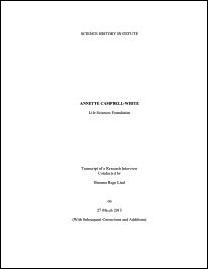Research Interview with Alison Taunton-Rigby
- 2013-Jan-22
Research Interview with Alison Taunton-Rigby
- 2013-Jan-22
Alison Taunton-Rigby was born and educated in Great Britain. Her father was a scientist for the British government and her mother was a physiotherapist. She attended the University of Bristol for her undergraduate and graduate degrees, studying chemistry, math, and physics. She came to the United States in October of 1968 when she was offered a postdoc position at the Woods Hole Oceanographic Institute, but she began working for Collaborative Research in Waltham, Massachusetts in February of 1969. There, she worked on a number of projects, such as one with MIT to synthesize the first ribosomal RNA gene, years before recombinant DNA was developed. Throughout the seventies and eighties, biotechnology companies were beginning to expand and in 1981, Collaborative Research was the second biotechnology company to go public. Taunton-Rigby had risen to the position of Vice President of Research & Development [R&D], the only woman in a seniority role at the company. She eventually left Collaborative Research for Biogen, where she was the Vice President of Business Development. Her job entailed finding new technology or potential products coming out of academia and raise money for R&D limited partnerships. The job required Taunton-Rigby to travel extensively, so she left and joined Damon Biotech, where she was the General Manager of their subsidiary company Vivotech, which was developing pancreatic islet cells for diabetics. The work never went fully commercial and Taunton-Rigby moved on to Arthur D. Little Inc., a research and consulting organization, where she helped pharmaceutical companies restructure their R&D to enhance molecular and cellular biology.
Still facing frequent travel demands, Taunton-Rigby joined Genzyme in 1987 after she was approached by Henri Termeer, the company’s CEO. There, she served as the Senior Vice President of Biotherapeutics. With Genzyme, Taunton-Rigby oversaw the development of highly successful products such as Ceredase. She eventually left Genzyme to become the CEO of Mitotix, which was developing a cancer drug but facing financial difficulties. She was later approached by Cambridge Biotech, who were in bankruptcy. She was brought in as their CEO and Director with the mission of turning the company around. The company had to go to bankruptcy auction for their diagnostics business, after which Taunton-Rigby moved the company and renamed it Aquila Biotherapeutics. When Aquila was merged with Antigenics in 2000, Taunton-Rigby left the company. She moved onto Catharsis Medical Technology, which created barcodes that nurses and doctors could use to cross reference a database and ensure a patient was receiving drugs that were compatible with one another, though found that hospitals were weary of working with a small company due to liability issues. Taunton-Rigby then helped to found RiboNovix with Phil Cunningham, which developed technology to understand the mutations of ribosomal RNA. The product never panned out due to rising costs and returned to development at Wayne State University. Taunton-Rigby sits on the board of five companies – three for healthcare and two for financial services – including Abt Associates, Boston Children's Hospital, Columbia Funds, and ICI Mutual Insurance. She also serves on a number of advisory boards.
| Property | Value |
|---|---|
| Interviewee | |
| Interviewer | |
| Place of interview | |
| Format | |
| Genre | |
| Extent |
|
| Language | |
| Rights | Creative Commons Attribution-NonCommercial-NoDerivatives 4.0 International License |
| Credit line |
|
About the Interviewer
Mark Jones holds a PhD in history, philosophy, and social studies of science from the University of California, San Diego. He is the former director of research at the Life Sciences Foundation and executive editor of LSF Magazine. He has served in numerous academic posts, and is completing the definitive account of the origins of the biotechnology industry, entitled Translating Life, for Harvard University Press.
Institutional location
| Department | |
|---|---|
| Collection | |
| Oral history number | 0166 |
Related Items
Cite as
See our FAQ page to learn how to cite an oral history.
Complete transcript of interview
taunton_rigby_a_0166_final_frf.pdf
The published version of the transcript may diverge from the interview audio due to edits to the transcript made by staff of the Center for Oral History, often at the request of the interviewee, during the transcript review process.









